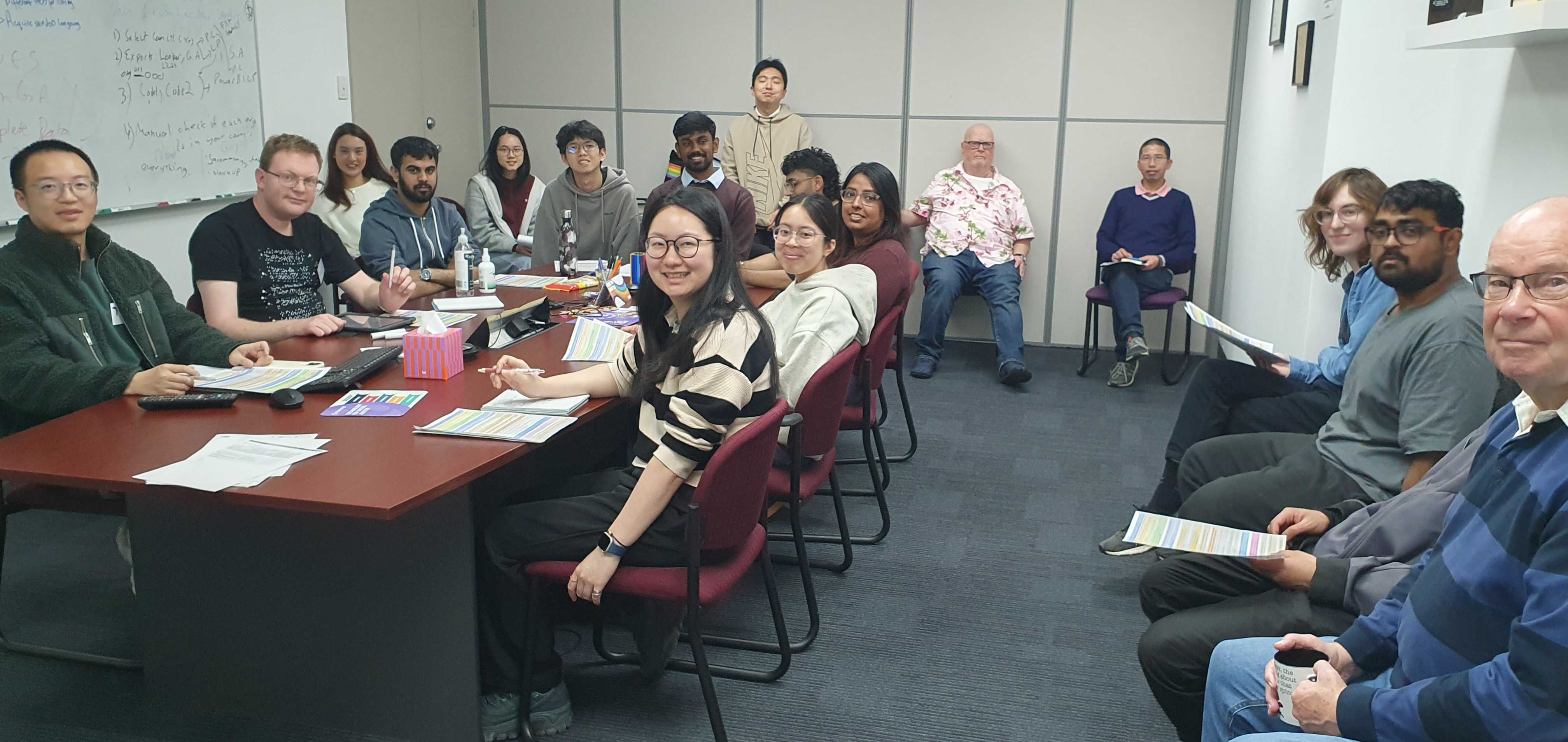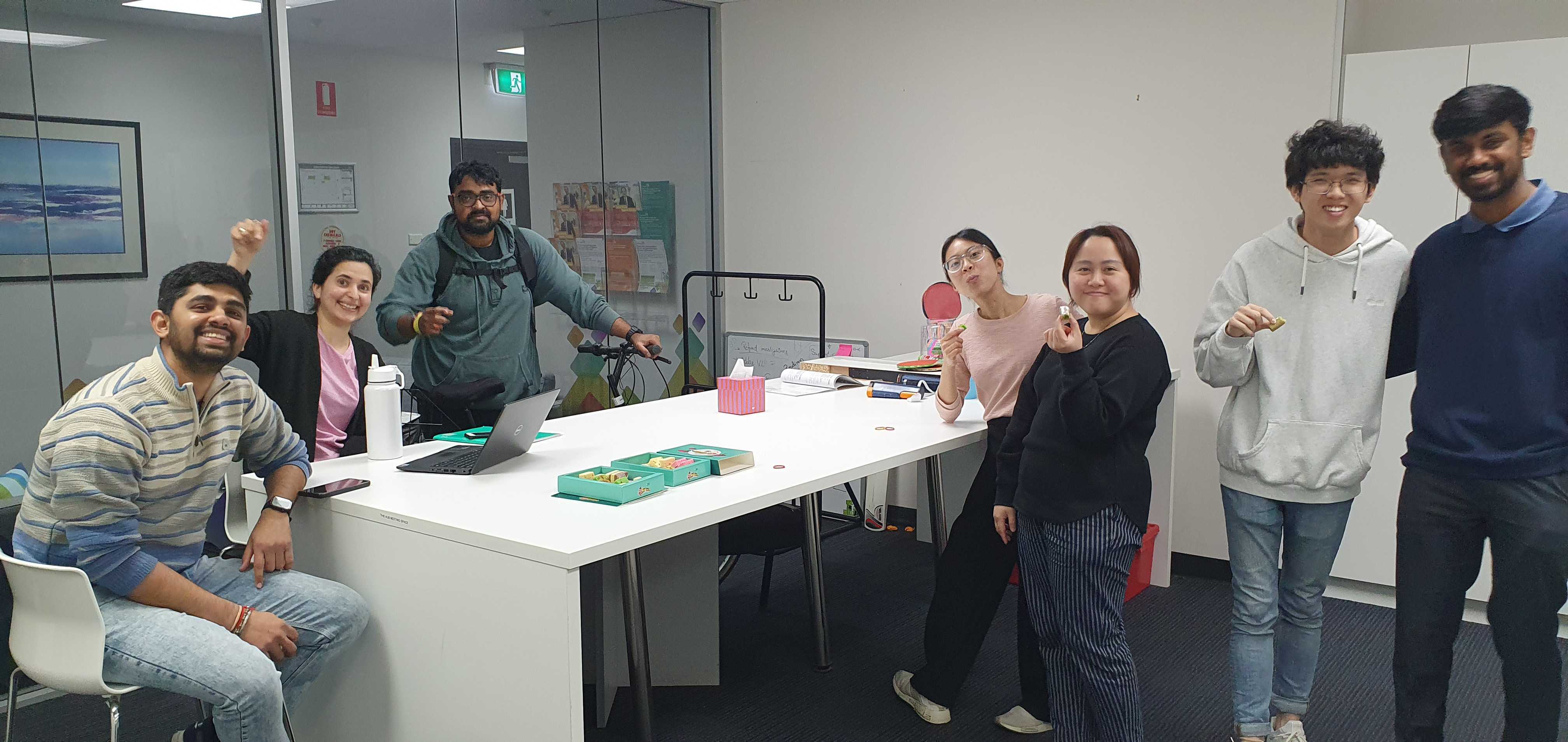Welcome Karthick!
Karthick joined our SAcommunity Data Analytics Team for his University of Adelaide SET (Sciences, Engineering and Technology) Internship for his Bachelor of Computer Science Semester 2, 2024: 13 August - Present.
He is completing a 140-hour internship onsite with SAcommunity at the Connecting Up Office, Infoxchange for 3 days (14 hours) a week for ~10 weeks, while balancing his coursework, and finishing his internship on the 25th of October.
We were pleased Karthick contacted us to update his portfolio on 8 November 2024 and let us know 23 March 2025 that he will be working at a part-time role in government in April 2025 alongside his university studies. Congratulations Karthick!
Total Hours 141 Joined 13 August 2024 Last Check-in 8 November 2024 (retired)
Personal Biography
Rajkarthick Raju is currently completing his Bachelor of Computer Science at The University of Adelaide in 2024, with interests in data science, cybersecurity, and artificial intelligence. He delivers exceptional customer service in this part-time role at the Coles Deli, ensuring a positive and efficient experience for customers.
Karthick is currently undertaking coursework at UofA focused on computer architecture, as well as the implementation of various data structures to solve complex problems. For a university group project, he led his team to develop a website for volunteer organisations, with user and admin functionalities for managing memberships, updates, and events.
He is Interning at Connecting Up, where he seeks to apply his theoretical knowledge and gain practical experience in a real-world IT environment. He also aims to build connections with industry professionals and to learn from their experiences to gain valuable insights into their field. Karthick plans to gain proficiency in data analytics tools such as PowerBI, Google Analytics, and Excel for effective data collection, cleaning, management, and analysis.
In the future, Karthick aims to deepen his expertise in computer science, with a particular interest in exploring cybersecurity and artificial intelligence. He is also committed to continuous learning and personal development, actively seeking opportunities to contribute to innovative projects and stay at the forefront of a rapidly evolving technological landscape.
Community Services in Councils Project
Karthick has selected the Port Adelaide Enfield council for his Power BI council reports, a database of approximately 683 community services operating in the area for the financial years 2022-2023 and 2023-2024. His reports followed previous visualisation report work by Stathis Avramis and Frank Xuifeng Shi, and his completed reports can be found>>here.
There are a number of steps involved in the creation of community service information data presentations. A summary of data trends prepared, using information from Google Analytics and SAcommunity with subsequent Power BI and Canva reports revealing data anomalies and corrections required, the database is updated and reports re-created with improved information. Final data reports are published to the website, and introduced by Karthick to Port Adelaide Enfield council stakeholders for information and/or feedback.
5 year Comparison Report
Building on
Harsh Bhatt's previous 4-year visualisation report, Karthick created a new 5-year comparison report to summarise data for the Port Adelaide Enfield Council. He also provided future interns and volunteers with a template to help them replicate this report for their own council summaries.
Image: Account Manager Eric Jenkins breifing Rajkarthick Raju about the project.
E-Commerce/CRM Data Analaysis Project
In this project, I analysed customer and donor data to create insightful PowerBI reports, highlighting trends and patterns that the marketing team can leverage for their strategies. During this process, I cleaned and then partitioned the data by financial year, country and product to generate better insights for the marketing team.
Image: Head of Connecting up, Pankaj Chhalotre, introducing us to our internship and giving us advice.
Orientation and Induction
The first day of my internship commenced with a stand-up elevator pitch where new interns, volunteers, and staff members introduced ourselves. We shared our reasons for joining the SAcommunity team and talked about our future aspirations. This was then followed by a message from Pankaj Chhalotre, Head of Connecting Up, where he outlined our mission and provided us with valuable advice.
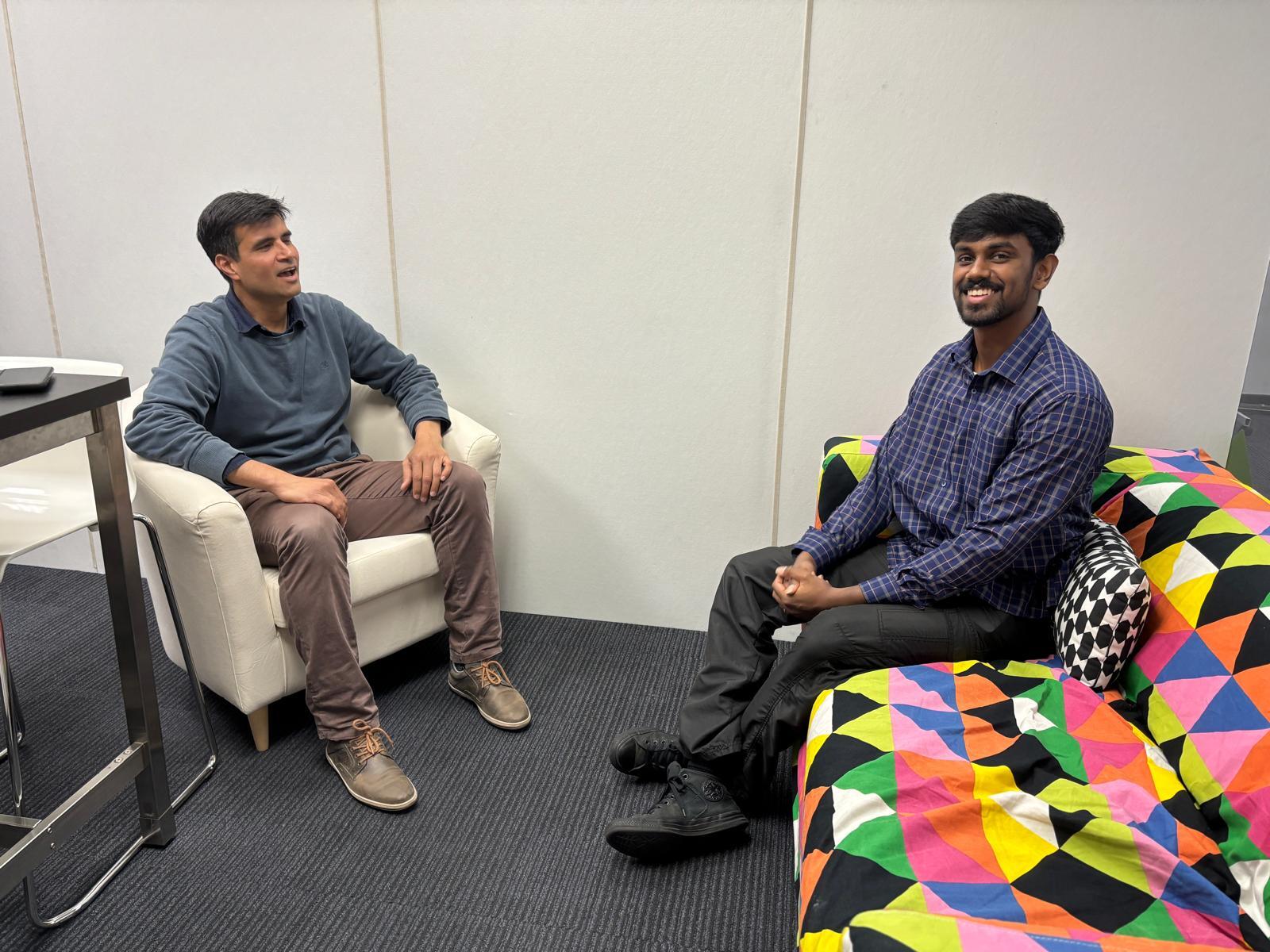
Image: Intern Rajkarthick Raju with his mentor Pankaj Chhalotre, Head of Connecting Up, Infoxchange.
Mentor Meeting 17th September 2024
Connecting Up Volunteers and Interns are provided with the opportunity to select staff members from across the wider Infoxchange organisation for an informational mentor meeting. Here they have the opportunity to ask more about staff members job roles and employment journey, and learn about their career and professional development, to gain insights and guidance that can be applied towards their own success.
Volunteers and interns both prepare 5 questions for their mentors and then are encouraged to record 5 aspects they felt were helpful for them to share on their portfolio for both themselves and other volunteers, and Karthick shared his experience in meeting Pankaj Chhalotre, Head of Connecting Up, Infoxchange.
Meeting with Pankaj Chhalotre was an invaluable experience that provided me with key insights into leadership, communication, and career development. He emphasised the importance of adapting communication styles to suit different audiences and offered practical strategies to improve these skills. His advice on leadership focused on inspiring others, building trust, and the importance of following through on commitments—principles I am keen to apply in my work.
From a hiring manager's perspective, Pankaj highlighted the value of listening, self-awareness, coachability, and communication adaptability. These attributes have given me a clear direction for self-improvement. He also encouraged me to actively pursue my interests in computer science, seek out a mentor, and stay curious about new opportunities. This meeting has given me a fresh perspective on my professional growth, and I look forward to applying these lessons to my career development.
Work experience - Internal and External Events, Connections and Networks
Volunteers and interns are encouraged to attend monthly SAcommunity Team meetings, Connecting Up staff meetings, as well as quarterly all-staff Infoxchange Town Hall meetings to understand more about the organisation as a whole.
Organisation-wide news, events and projects are communicated through the staff channels, with weekly CEO Updates from David Spriggs. Informal 'Lunch and Learn' educational sessions, and network meetings create connections with staff. Whilst peer-to-peer training or capacity building and telephone techniques training allow for networking with other volunteers. Interns are also given opportunities to attend stakeholder and partner events as they arise.
Relevant meetings and training sessions Karthick has attended include:
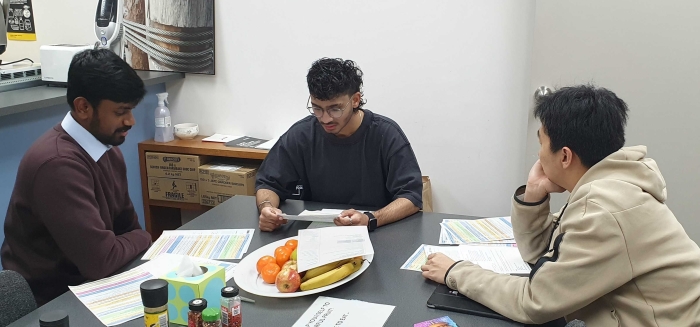 Telephone Techniques 11 September 2024: Rajkarthick Raju, Shoaib Khalid and Aaron Xuefeng Li
Telephone Techniques 11 September 2024: Rajkarthick Raju, Shoaib Khalid and Aaron Xuefeng Li
Training and Development - Telephone Techniques
All interns and volunteers at SAcommunity undergo telephone techniques training, as strong phone etiquette is essential for team members. This training helps Data Analytics Team members understand directory and data collection methods, update their datasets, and present reports to council stakeholders. Interns receive a telephone script to ensure professionalism and effective communication. Multiple training sessions are conducted during the internship to provide opportunities for practice and skill development.
SAcommunity Team Meetings
Volunteers and interns actively participate in team meetings to discuss current challenges, explore solutions, set future goals, and receive project guidance.
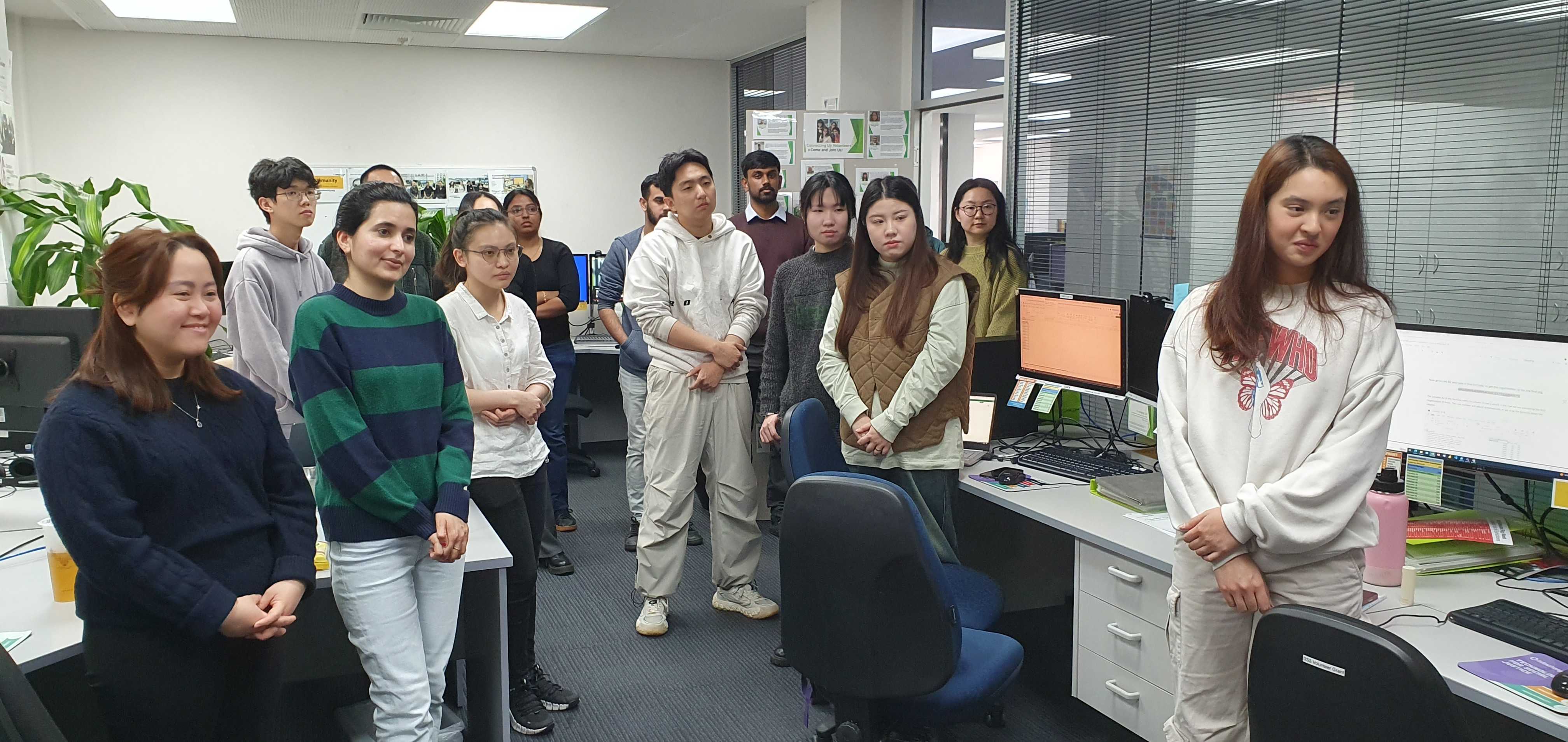
Image: SAcommunity Monthly Meeting 04 September 2024 with Stathis, Head of SAcommunity Data Analytics Team
IX Lunch & Learn Sessions
Health & Wellbeing Webinar - Foods to Boost Your Mood on 20 August 2024
This webinar, led by Elaine Fox, Head of Product and Innovation at Healthworks, focused on the impact of diet on mood. She provided a comprehensive overview of how dietary choices can directly influence emotional well-being.
Elaine recommended a healthy, complete diet, centered around minimally processed, plant-based foods with the addition of high quality proteins (seafood, lean meats and dairy). She also gave us practical guidelines to ensure a healthy diet, including consuming five servings of vegetables and two servings of fruit, incorporating Omega-3 fats from fish and nuts, and maintaining adequate levels of vitamins and minerals.
Elaine also discussed the temporary mood lift from consuming 'junk' food, which is often high in calories but low in nutrients. This brief energy boost is usually followed by a crash, leading to fatigue and irritability. Over time, this pattern can create a cycle of unhealthy eating, contributing to weight gain and raising the risk of both mental and physical health problems.
In conclusion, the webinar motivated me to incorporate more fruits and vegetables into my diet and restrict my consumption of 'junk' food.

Innovation at Infoxchange Webinar - Let's talk Innovation on 25th September 2024
Jo Davies, the Chief Operating Officer at Infoxchange, gave a compelling presentation on the different aspects of innovation. She highlighted that innovation isn't just about new ideas, but encompasses incremental changes, organisational improvements, and disruptive shifts. For instance, she cited the development of razor designs as incremental innovation, while disruptive innovations were exemplified by companies like Airbnb and Netflix. Radical innovations, such as smartphones, were also discussed.
A key concept I took away was the 3 Horizons model, which breaks down innovation into three stages: Now, Near Term, and Future. Jo Davies linked Infoxchange’s offerings to these stages and introduced the 70/20/10 Principle, recommending organisations spend 70% on current operations, 20% on growth, and 10% on exploring new ideas. This framework was very logical and straightforward, encouraging me to structure my own career development, balancing present goals with long-term ambitions.
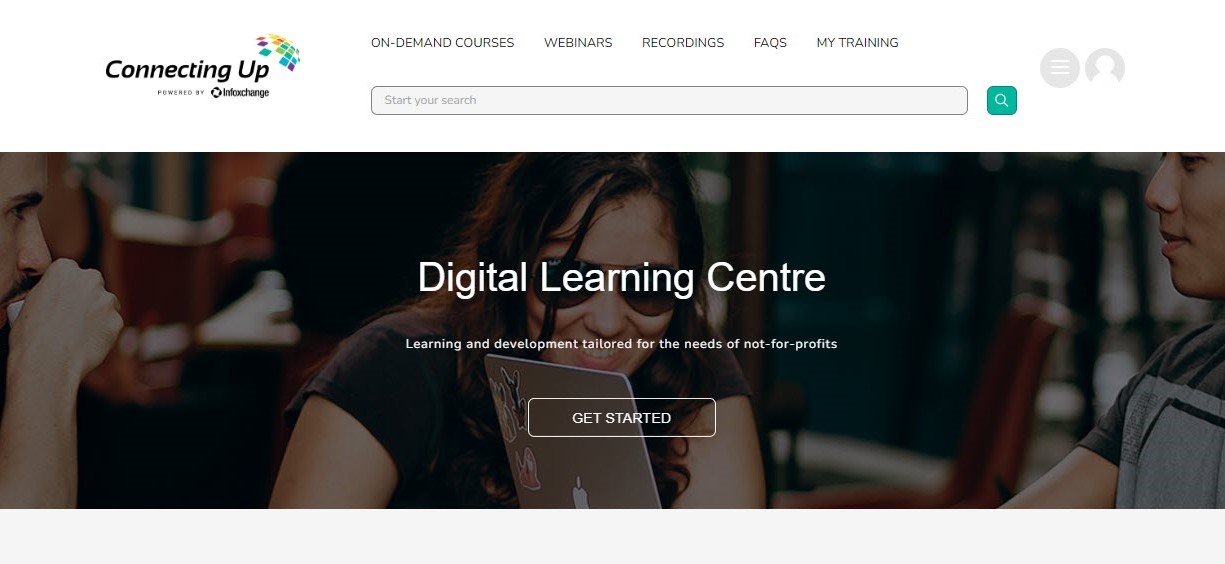
Digital Training & Development
Volunteers and interns have access to the
Connecting Up Digital Learning Platform providing
live webinars and
recorded webinars, workshops and webcons presented by subject-matter experts to understand more about a range of technology topics for the not-for-profit sector.
Karthick selected, attended, summarized, and evaluated relevant training sessions to explore how they could enhance his internship experience, including:
Artificial Intelligence for Social Impact
I recently watched a online webinar on Artificial Intelligence (AI), hosted by Ryan Harrington, where I learned about its key concepts and various types. AI refers to machine-based systems that, given specific objectives, make predictions, recommendations, or decisions that influence real or virtual environments.
The types of AI discussed included:
- Machine learning: Involves making predictions using data, with supervised learning relying on a training dataset.
- Natural Language Processing (NLP): Extracts meaning from text and can be used for translation or chatbots like ChatGPT.
- Expert systems, vision, planning, robotics, and speech: Examples include self-driving cars and speech recognition.
We also covered Generative AI, a subclass of NLP, which requires vast amounts of data to generate creative content across multiple modalities. I learned that tools like GPT are trained using tokenisation to understand the relationships between words, with human input refining the model’s responses. However, challenges such as hallucinations—AI creating incorrect but confident-sounding responses—were also discussed.
Key AI considerations included:
- Safety: Avoiding harm to individuals, organisations, or ecosystems.
- Accountability: Determining who is responsible for AI outcomes—whether it's the customer, organisation, or developer.
- Transparency: Understanding how AI evaluates outcomes and its decision-making criteria.
- Fairness: Ensuring AI does not use sensitive or irrelevant data.
Potential solutions like AI Bill of Rights and Australia's AI Ethics Framework were mentioned, though these are currently voluntary guidelines.
Cybersecurity for IT Managers
I watched a recorded webinar on
Cybersecurity for IT Managers, hosted by
David McLean, which provided insights into the latest trends and best practices for protecting IT systems. I learned that financial losses from email compromises have risen to over $98 million, with small and medium businesses incurring higher costs due to vulnerabilities. The primary source of breaches is through phishing emails, and 82% of breaches involve human error, especially in non-profit organisations that often handle sensitive data.
Key takeaways for securing different layers of IT systems include:
-
Protecting IT Networks, Devices, Applications, and Data: Encrypt confidential data, shred physical documents, and avoid leaving sensitive information exposed.
-
Multifactor Authentication: Implementing this is crucial for enhanced security.
User Access Security was emphasised, highlighting the importance of using strong passwords, not sharing credentials, utilising password managers, and checking if data has been compromised. Staff should be guided on how to safely use personal devices for work.
For online safety, we covered measures such as avoiding unauthorised software downloads, using firewalls, VPNs, anti-malware software, and secure network protocols. Ensuring proper wireless network configuration was also stressed.
A crucial point was to establish a contact point for staff, such as IT support, to report any security concerns. Common security threats include phishing, ransomware, business email compromises, supply chain attacks, and misconfigurations.
Lastly, I learned how to detect phishing emails to help prevent cyber incidents.
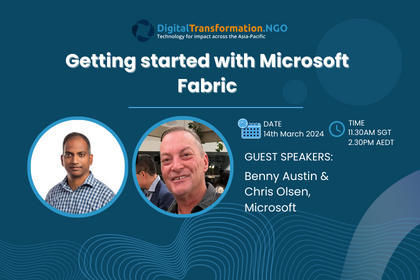
Getting started with Microsoft Fabric
I viewed another recorded webinar on
Getting Started with Microsoft Fabric, hosted by
Benny Austin and
Chris Olsen, which provided insights on simplifying data analysis by avoiding the complexity of integrating multiple tools.
Microsoft Fabric is a unified Software as a Service (SaaS) platform that allows users to input data and get results without worrying about integration or technical nuances. The platform is secured and governed by Microsoft, yet remains open for use with other tools. It’s integrated into Microsoft 365 and features Copilot for AI-driven insights, including GPT applied to your data.
Key components of Microsoft Fabric include:
-
Data Factory: Prepares data for operations.
-
Synapse: Enables data warehousing and actionable insights without compromising security.
-
Power BI: Used to visualise data.
-
Data Activator: A no-code solution for automatic actions based on detected patterns.
-
One Lake: Ensures a single copy of data for use across various applications, preventing unnecessary duplication.
Since the platform is unified, security is seamless across all applications. Users must purchase capacity, with F2 being suitable for small businesses, while higher capacities (e.g. F64) include Copilot. There’s also a Pause Resume feature to save processing costs, though storage cannot be paused.
During the demo, I learned that Synapse Data Engineering operates similarly to Excel but stores data in the cloud, allowing the use of SQL queries and tools like Python. It's ideal for handling large datasets with real-time changes and is more efficient than traditional Excel for data storage and analysis.
The platform also includes Copilot, which handles complex coding and Excel formulas based on user commands, making it an easy-to-use tool, though it requires additional costs. Finally, Microsoft Fabric supports integration with other services like Azure, Amazon, and Google to enhance flexibility and functionality.
Cybersecurity for NGOs
In a webinar led by
Vineet Kumar from
CyberPeace, key cybersecurity risks for non-profit organisations (NFPs) were discussed. With increasing tech connectivity, even NFPs are vulnerable to attacks like the Blackbaud incident and the Red Cross attack. Common cyber-attacks include phishing, where AI tools now make emails harder to detect, ransomware, which locks data until a ransom is paid, and DDoS attacks, which overwhelm networks. Other threats include SQL injections, malware, and social engineering tactics like sextortion and spearfishing.
Preventive measures include regular employee training, strong passwords, two-factor authentication, and data encryption. Regular security audits, clear vendor contracts, and an incident response plan are essential. Mobile security advice included using authentication, regular backups, securing Wi-Fi with WPA2, and enabling remote wipe for lost devices.
Finally, the webinar highlighted free open-source tools for NFPs, such as pfSense for firewalls, ClamAV for antivirus protection, and support from TECHSOUP. CyberPeaceTV also offers useful cybersecurity content for NFPs.
Final Reflection
During my internship at SAcommunity, I gained invaluable experience in both technical and interpersonal skills. I improved my proficiency in Power BI and Excel, learning how to effectively modify and visualise data. Engaging in Lunch & Learn sessions and team meetings allowed me to gain career-relevant insights, while deepening my understanding of leadership principles.
Through Connecting Up webinars, I expanded my knowledge on key topics such as cybersecurity and AI. Under the guidance of Pankaj Chhalotre, Head of Connecting Up, I identified areas for self-improvement and gained clarity in career direction. Overall, this internship has advanced my technical abilities and refined the soft skills essential for thriving in a professional environment.

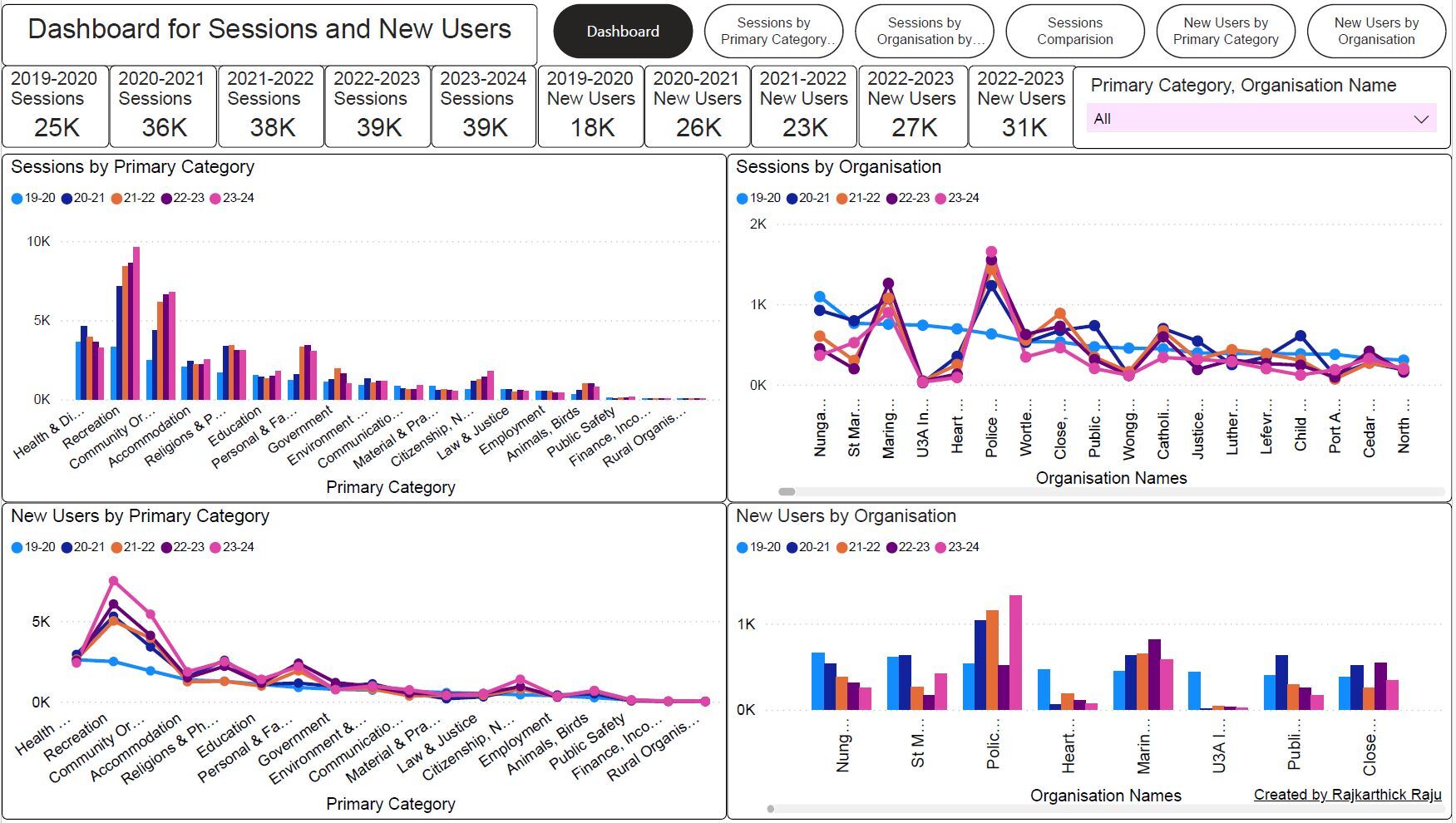
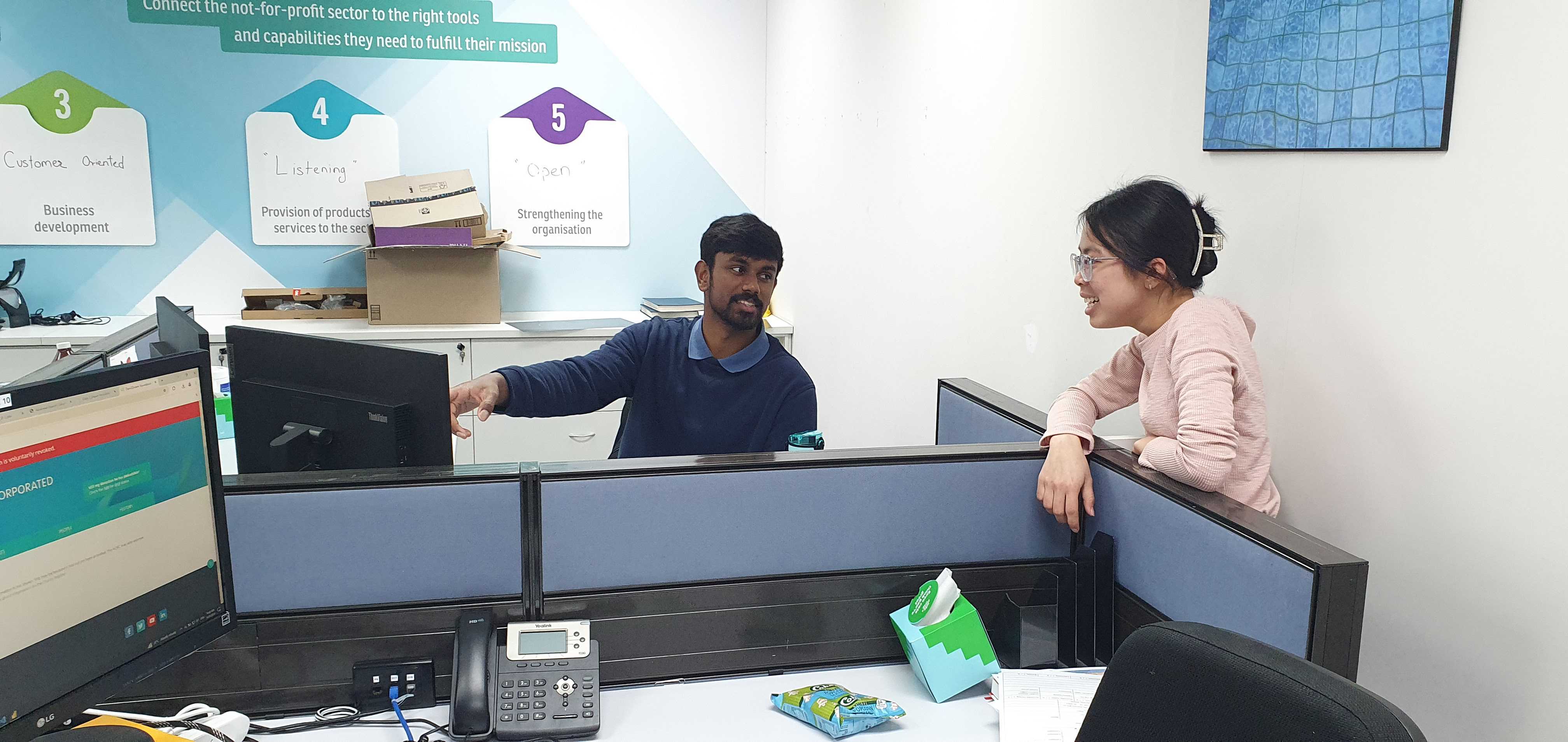
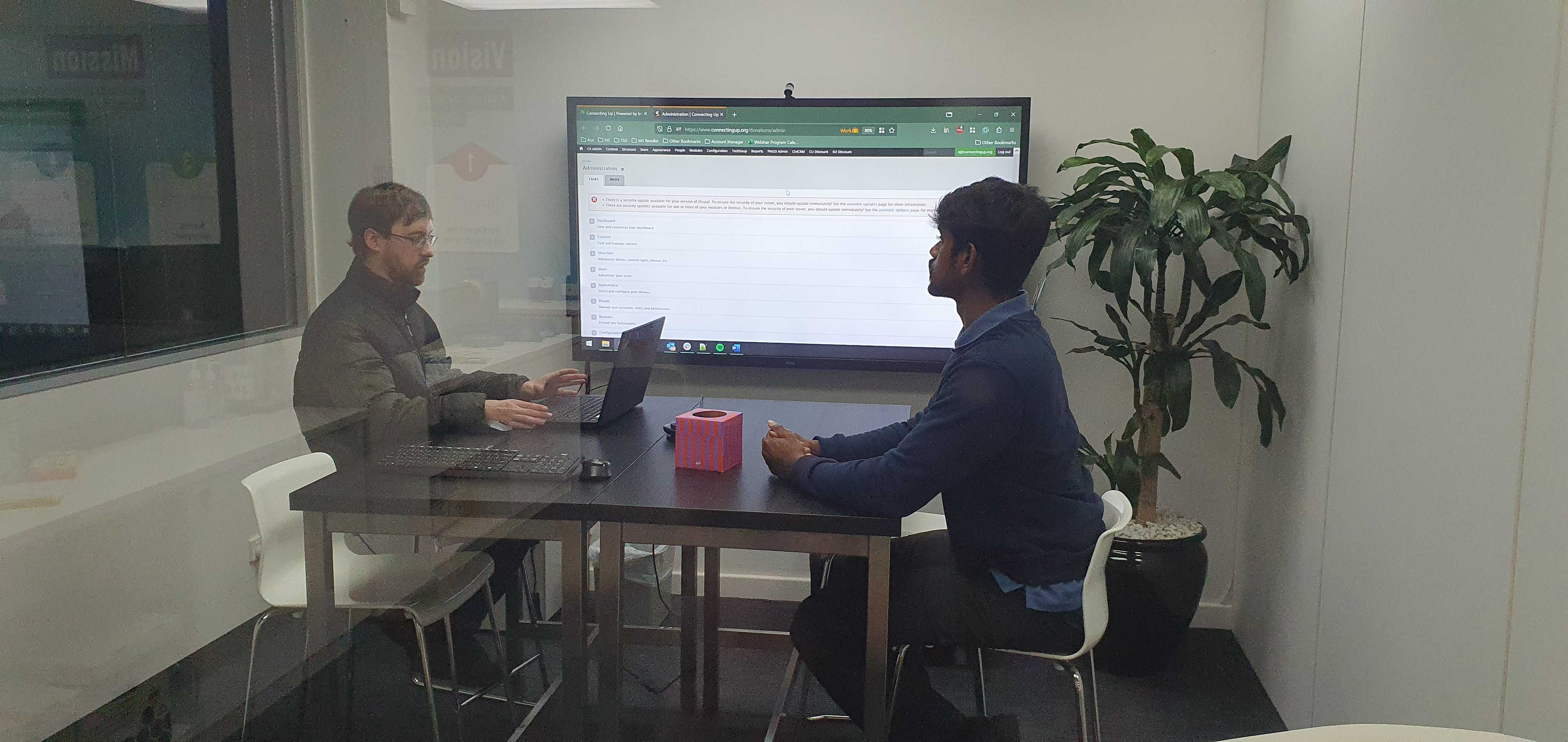
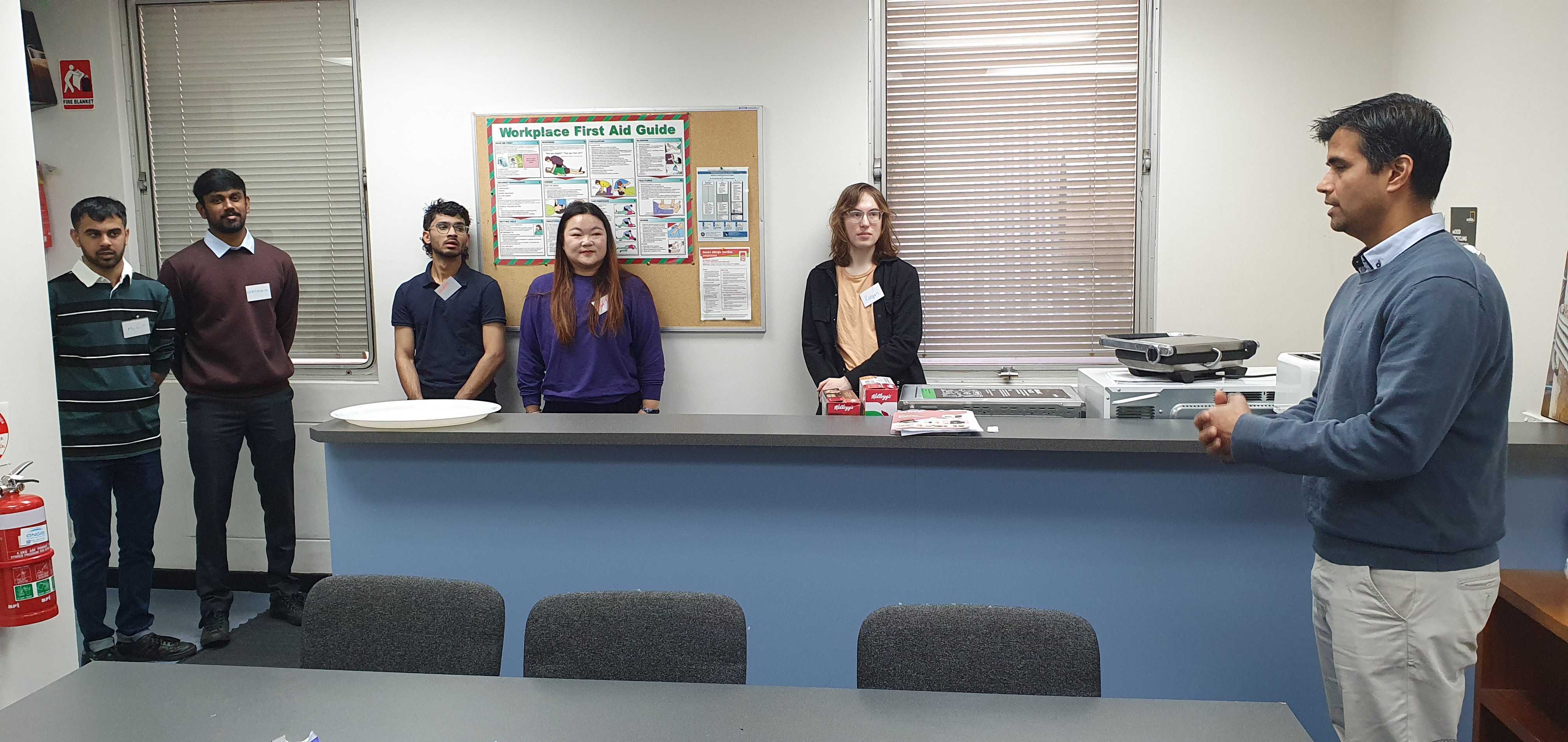

 Telephone Techniques 11 September 2024: Rajkarthick Raju, Shoaib Khalid and Aaron Xuefeng Li
Telephone Techniques 11 September 2024: Rajkarthick Raju, Shoaib Khalid and Aaron Xuefeng Li